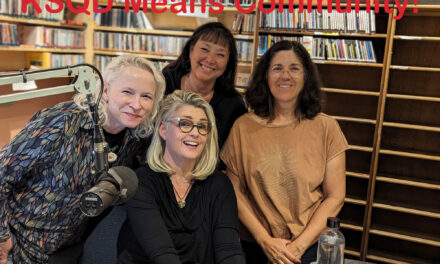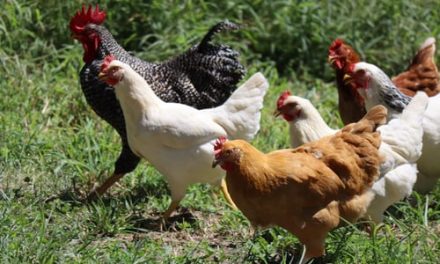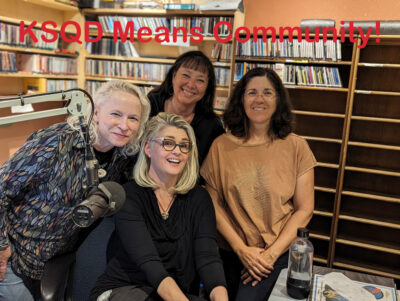
This story was reported by Lara Streiff of the UCSC Science Communications program.
LARA: When the COVID-19 pandemic first started making headlines, media outlets reported on the day to day changes as they themselves began to feel the financial impacts.
My name is Lara Streiff, and I spoke with two journalists, one from a local weekly paper, and one from an international digital news site, to find out how their work has been affected.
When you now click on the news section on the Monterey County Weekly’s website, a banner asks for reader contributions, something the paper didn’t need three months ago. Sara Rubin is one of the remaining staff members for the publication serving the Monterey Peninsula. Many of their core advertisers in the entertainment and restaurant industry have closed for business, and that has had a ripple effect.
SARA: Even in the week, or two, leading up to shelter in place as the pandemic became such a real fear… there was a very fast, quickly evolving change of public health advice.
And with that, a lot of our advertisers did fully close or saw major cutbacks.
LARA: Rubin’s team still manages to churn out a weekly printed paper, as well as daily digital updates, to inform the Monterey community about the impacts of Covid-19. According to Buzzfeed science reporter Peter Aldhous, their news site is experiencing some of the same impacts.
PETER: We are like most media, fairly heavily dependent on advertising and that is the real issue at the moment …people are talking about 30-50% reductions in advertising revenue. As you can imagine, if that is one of your main revenue streams that’s gonna hit pretty hard.
LARA: For Buzzfeed, it meant closing their San Francisco office as their reporters work from home.
PETER: The strategy has been to try and reduce costs without layoffs.
Closing an empty office — its lease is about to expire — it’s probably one of the least difficult decisions to take.
LARA: For the Monterey County Weekly, the office stays open, but other changes were made to adapt to shelter in place conditions.
SARA: Our distribution locations plummeted as all these businesses were forced to close. So the places that people used to pick up the paper, 900 or so locations around Monterey County, are suddenly not available…that drove us to make a smaller newspaper, change the number of locations it is distributed at and refill those fewer locations with much more frequency — grocery stores and pharmacies that are more regularly visited.
LARA: Rubin says the Weekly laid off one third of its staff when the County’s Shelter in Place order was announced. Though Buzzfeed News is published exclusively online, they were also not immune to staff cuts.
PETER: We had what I think was a really lively and innovative video show on Twitter, a morning show called AM to DM. Unfortunately, those people have been laid off.
LARA: Employees at Buzzfeed agreed to take salary cuts to avoid additional layoffs. However, Buzzfeed has furloughed additional staff since this interview took place, and the reporting load continues.
PETER: For some you may still be in a job but you might have less work. That is definitely not the case in journalism, you are working from home and there is more work.
SARA: We’re on deadline now everyday.
We’ve created a daily newsletter that we call Monterey County Now. which I encourage people to sign up for if your listeners here this, its monterey county weekly.com/signup
It’s a faster kind of turnaround and we have fewer people so I think that inevitably makes it feel like more work.
PETER: You know I watch twitter and I see that some people are talking about boredom, the boredom of being at home. That’s certainly something that I have not been experiencing- the boredom- because I haven’t had time to get bored really.
LARA: For survivors of the journalism layoffs, the reporting process has changed along with the topics they cover.
SARA: We’ve done a few news stories that are not immediately related to covid but overwhelmingly they are…
PETER: I think most journalists who are covering this, and frankly I don’t think there’s any journalists who aren’t covering this. Whatever you normally do, you are –doing a version of that. The San Jose Mercury News, they’ve moved sports reporters, because there’s no sports going on, they’ve moved sports reporters onto reporting on aspects of covid-19.
LARA: There are also more consumers of news than usual. According to the Pew Research Center, an overwhelming majority of all U.S. adults, 92%, are following news about the COVID-19 pandemic. PETER:
We’re a site that gets quite a bit of traffic all the time, and the interest we have in our COVID-19 coverage is just like, we haven’t seen this before, I haven’t seen this in 5 years working for Buzzfeed.
And yet it’s a very unsettling time in terms of our ability to keep doing that, because in terms of you know the ability to generate revenue, is bad, at a time when the metrics which editorially you want to go for — reaching people, connecting with people, getting what you hope is reliable information out there, are better than they’ve ever been before.
LARA: So normally this would be a great time to get advertisers
PETER: In a normal situation it probably would, yeah.
But we are not, in a normal situation, clearly.
LARA: Sara Rubin is leading the Monterey County Weekly as it adapts to survive, while Buzzfeed News continues business-as-usual, despite dwindling resources.
PETER:Burnout is definitely an issue we are all thinking about.
If you’re a reporter and the biggest story in the world is in front of you, what do you want to do? You want to report on it. And in some ways I do think reporters do need managers to tell them, look back off a bit. We all need to take a break here every now and again.
LARA: As readers rely on them for information, these news outlets continue reporting as best they can.
PETER:
We’re in a very tough time.
But then, you know, the world is in a very tough time, and there are certainly other industries that have been affected worse than we have been.
LARA:This has been Lara Streiff reporting.











